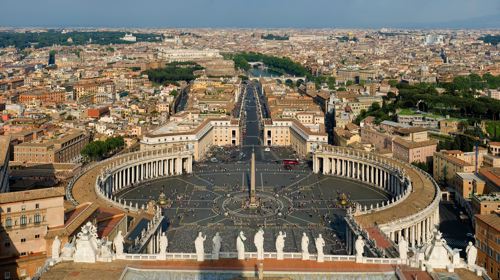
It’s a Good Friday indeed.
If you view this in RSS or e-mail, you’d be remiss not to head over to the actual site for once today. The Holy See welcomes you to the relaunch of Popeconomics.com, henceforth known at PopeConomics.com. We’re making a lot of changes around here and hope you appreciate the site’s gradual conversion from a bastion of capitalism to an altar to higher pursuits.
But not to fear. The Holy See recognizes that you’ve come here expecting lessons in economics and so forth. While we imagine our lessons might get a little more, well, religious going forward, we’ll try not to disappoint. Here’s a crash course in how your religion might impact your finances. Trust us, there’s no separation of church and wallet.
It’s best for your partner to have the same religion.
We all know how expensive divorce is. And whether your marriage is interfaith or not makes a difference in how likely you are to face it. That’s not just our faith talking. It’s economic fact. The 1987-88 National Survey of Families and Households found that marriages between a couple with the same religion had a one in five chance of divorcing in the first five years. Couples with different faiths had between a one in four chance and a two in five chance of divorcing in the same amount of time, depending on how different their faiths were.
Economists guess this is because couples with the same religion are able to share more activities not only in the church or other place of worship, but beyond it. You’re able to teach your children about the religion together, participate more in the same social circles, and might even be happier with the location you choose to live in.
The best hope that those interfaith couples had of making it? Conversion for one of the partners. Seriously. Converted couples had just as much a chance of making it as if they were the same religion all along.
The wages of men and women are on more even ground among Catholics.
Ok, ok, mainstream Protestants have this advantage, too. But conservative Protestants and Mormons take note. Economists have found that your religions predispose women to become housewives earlier in life, meaning that you women out there won’t make as much money (or build the skills to make as much) as you would have had you not had children or gotten married.
Catholics used to fit women into traditional gender roles too, but that’s moderated over time. On average though, conservative Protestantism and Mormonism still lead women to stay in the home and not go out and make moolah.
And conservative Protestants tend to make the least money.
That’s for both genders. Turns out, conservative Protestants tend to have the fewest years of schooling (13.3 for males and 12.9 for females) versus Jews (16.9/15.8), mainstream Protestants (14.5/14.0), and we Catholics (14.3/13.7).
Economists have found that those differences in education lead to wage discrepancies. Jews tend to make the most money. Conservative Protestant women make the least. The same holds for accumulated wealth. Jews tend to accumulate the most again, with mainstream Protestants and Catholics in the middle, and conservative Protestants at the bottom.
So you see, your choice of religion (or the one you fell into by happenstance) doesn’t have just spiritual impact, but a material one too.
And remember: April 1st is for fools. April 2nd is for Pop.
P.S.: All the economics stuff was true. Truly in studies anyway.
![]()
{ 3 comments… read them below or add one }
your choice of religion (or the one you fell into by happenstance) doesn’t have just spiritual impact, but a material one too.
It’s not such an odd finding. If the afterlife is a priority for you (this is more true for conservative Protestants than it is for mainstream Protestants), you are going to focus more of your limited energies on that than on making it all pay off in this world.
Also, it could be that the causation goes the other way. It could be that people who make less money tend to find comfort in religion. I am not trying to suggest that this is a bad thing, just that it might be something going on.
Jesus said that it’s harder for a camel to get through the eye of a needle than for a rich man to get into heaven. That one has always worried me. I think it might have had something to do with my decision not to practice law!
Rob
I think there’s a good chance that there’s no causation at all. Other parts of the cultural backgrounds of people raised Catholic, Protestant, or whatever might just have also led to those economic consequences. I’d want to see a study of, say, converts to conservative Protestantism to see if they got the same economic faults as their culturally Protestant peers.
It is also possible that those of more conservative faiths consciously choose to spend their time in pursuits that lead to something other than earthly wealth. And while “the wages of men and women are on more even ground among Catholics,” I suspect that the Holy See would postulate that “the wages of sin is death.” Thanks, Pop, for your efforts to help us avoid economic sins.